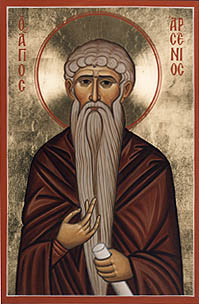
Coming one day to see his children at their studies, Theodosius found them sitting while Arsenius talked to them standing. This he would not tolerate, and caused the teacher to sit and the pupils to stand. On his arrival at court Arsenius had been given a splendid establishment, and probably because the Emperor so desired, he lived in great pomp, but all the time felt a growing inclination to renounce the world. After praying long to be enlightened as to what he should do, he heard a voice saying "Arsenius, flee the company of men, and thou shalt be saved." Thereupon he embarked secretly for Alexandria, and hastening to the desert of Scetis, asked to be admitted among the solitaries who dwelt there.
St. John the Dwarf, to whose cell he was conducted, though previously warned of the quality of his visitor, took no notice of him and left him standing by himself while he invited the rest to sit down at table. When the repast was half finished he threw down some bread before him, bidding him with an air of indifference eat if he would. Arsenius meekly picked up the bread and ate, sitting on the ground. Satisfied with this proof of humility, St. John kept him under his direction. The new solitary was from the first most exemplary yet unwittingly retained certain of his old habits, such as sitting cross-legged or laying one foot over the other. Noticing this, the abbot requested some one to imitate Arsenius's posture at the next gathering of the brethren, and upon his doing so, forthwith rebuked him publicly. Arsenius took the hint and corrected himself.
During the fifty-five years of his solitary life he was always the most meanly clad of all, thus punishing himself for his former seeming vanity in the world. In like manner, to atone for having used perfumes at court, he never changed the water in which he moistened the palm leaves of which he made mats, but only poured in fresh water upon it as it wasted, thus letting it become stenchy in the extreme. Even while engaged in manual labour he never relaxed in his application to prayer. At all times copious tears of devotion fell from his eyes. But what distinguished him most was his disinclination to all that might interrupt his union with God. When, after long search, his place of retreat was discovered, he not only refused to return to court and act as adviser to his former pupil the Emperor Arcadius, but he would not even be his almoner to the poor and the monasteries of the neighbourhood. He invariably denied himself to visitors, no matter what their rank and condition and left to his disciples the care of entertaining them. His contemporaries so admired him as to surname him "the Great".




